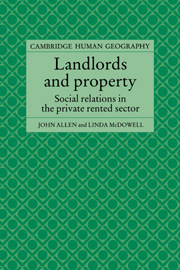Book contents
- Frontmatter
- Contents
- List of figures and tables
- Preface
- 1 Introduction
- 2 Private landlords: the anatomy of uneven decline
- 3 The structure of private landlordism
- 4 Research design and methods
- 5 Landlords in profile: an intensive survey
- 6 Landlords in the inner city: an extensive survey
- 7 Political ideologies and private rental policies
- Policy postscript
- Appendix 1 Selecting the landlord sample from housing waiting list records
- Appendix 2 Who was rehoused?
- References
- Index
6 - Landlords in the inner city: an extensive survey
Published online by Cambridge University Press: 17 September 2009
- Frontmatter
- Contents
- List of figures and tables
- Preface
- 1 Introduction
- 2 Private landlords: the anatomy of uneven decline
- 3 The structure of private landlordism
- 4 Research design and methods
- 5 Landlords in profile: an intensive survey
- 6 Landlords in the inner city: an extensive survey
- 7 Political ideologies and private rental policies
- Policy postscript
- Appendix 1 Selecting the landlord sample from housing waiting list records
- Appendix 2 Who was rehoused?
- References
- Index
Summary
The main purpose of this chapter is to show how the particular characteristics of local housing markets at a point in time, modify, realise or constrain the emergent causal powers landlords possess by virtue of their membership of a particular group. Whether and how the causal powers of different groups of landlords operate depends upon certain social conditions, that is, upon their interaction with certain kinds of contingent circumstances and events. This chapter will attempt to unravel several different strands of this type of explanation. The first strand is the association between the different groups of landlords, inscribed with potential ways of acting, and the three possible courses of action outlined in Chapter 2: reinvestment, disinvestment and informalisation, and their various sub-trends. Whatever strategy or strategies are pursued by groups of landlords cannot be known in advance of the second strand, the nature of the housing markets in which they operate. Landlords in our extensive study, with certain exceptions, mainly operated across two local authority areas – a geographical space that is differentiated by type of property, degrees of environmental attactiveness and by accessibility to a range of local goods and services. In turn these different characteristics affect the way in which rents and house prices vary across space and so rates of profit from reletting or sale.
- Type
- Chapter
- Information
- Landlords and PropertySocial Relations in the Private Rented Sector, pp. 110 - 159Publisher: Cambridge University PressPrint publication year: 1989



